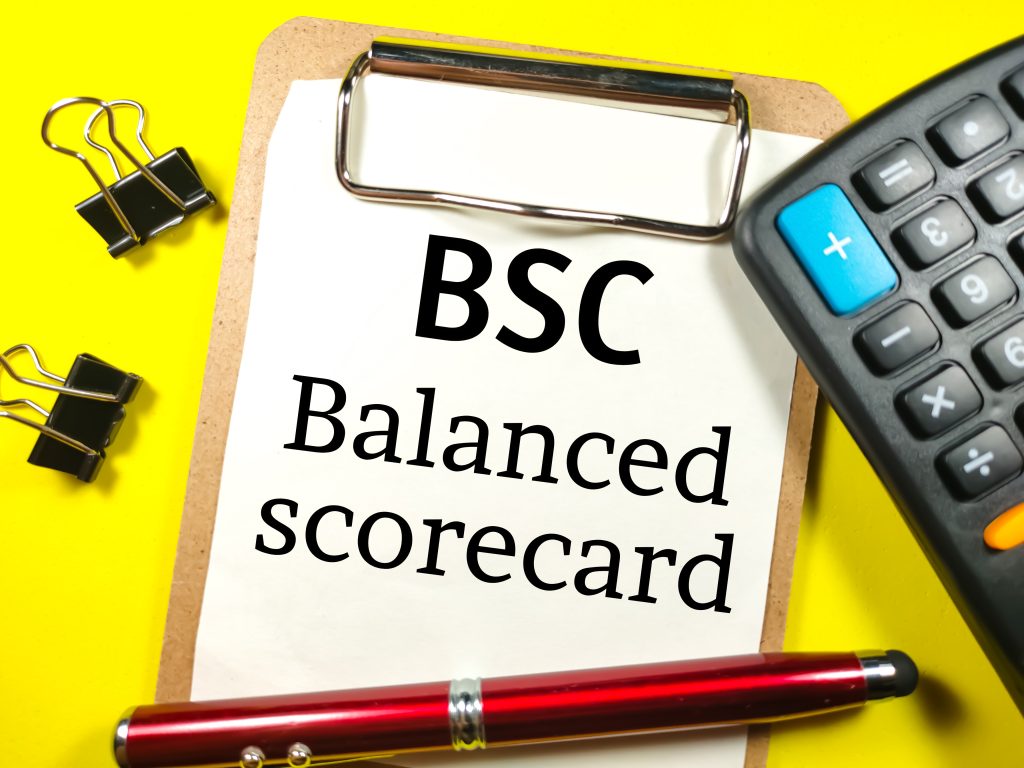The Balanced Scorecard (BSC) is a strategic tool widely used by organizations to align their business activities with the company's vision and strategy.
In the Human Resources (HR) context, this methodology becomes even more relevant by integrating performance indicators beyond traditional financial metrics, encompassing aspects such as employee satisfaction, skills development, and competency enhancement.Keep reading to learn more!
What you will find on this blog:
ToggleWhat is the Balanced Scorecard?

The Balanced Scorecard (BSC), developed by Robert Kaplan and David Norton, professors at Harvard Business Review, is essential for managing a company's performance.
This methodology transforms business strategy into concrete operational objectives, driving performance and organizational behavior.
Moreover, the BSC is based on four fundamental perspectives, which we'll discuss in detail. It offers a balanced view of the business and goes beyond financial indicators, covering all the critical aspects of the company's success.
In Human Resources, the Balanced Scorecard is adapted to measure and manage HR performance, allowing the team to align its activities with the organization's strategic goals.
This adaptation facilitates the monitoring and improving internal people management processes, significantly contributing to organizational success.
Are you looking for strategic management software? Get to know Tune by Actio!
Components of the Balanced Scorecard in HR
Just like the traditional BSC, the Balanced Scorecard in HR is composed of four main perspectives:
1- Financial perspectiveEven in HR, initiatives must align with the organization's financial results. Indicators like ROI on training and turnover cost are examples of metrics used.
2- Customer Perspective:In HR, the "customers" are the employees. Satisfaction indicators, talent retention, and engagement are crucial for understanding how HR actions impact the company's human capital.
3- Internal processes perspective: Here, critical HR processes like recruitment, selection, training, and development are monitored. The goal is to ensure these processes are efficient and effective.
4- Learning and growth perspectiveThis perspective focuses on developing employees' capabilities and skills, ensuring the organization has the human resources necessary to face future challenges.
The Importance of BSC for HR

Applying the Balanced Scorecard in HR is essential for aligning people strategy with the organization's goals.
In this way, HR plays a crucial role in implementing the BSC, as it is responsible for developing and managing the skills and behaviors needed to achieve strategic goals.
HR can directly contribute to the company's growth and sustainability by adopting the BSC.
How to Implement the BSC in HR
Implementing the Balanced Scorecard (BSC) in the Human Resources (HR) department can be a decisive strategy for aligning HR activities with the company's strategic objectives, making HR a true partner in pursuing organizational results. Check out below how to efficiently implement it:
1- Define HR's Vision and Strategic Objectives
The first step in implementing the BSC in HR is clearly defining the company's vision and strategic objectives.
Additionally, these objectives must be directly connected to the organization's mission, and from them, HR should identify how its actions can contribute to achieving these goals.
For example, if the company seeks to be recognized for innovation, HR should focus on attracting, developing, and retaining talents that can drive creativity and innovation within the organization.
2- Establish Performance Indicators (KPIs)
With objectives defined, establishing performance indicators, also known as KPIs, is essential.
In the BSC context, KPIs should cover the four classic perspectives:
- Financial: How do HR initiatives impact profitability and costs?
- Customer: How does HR influence the satisfaction and loyalty of internal and external customers?
- Internal Processes: Which HR processes are critical to achieving operational excellence?
- Learning and Growth: How is HR developing human capital and fostering innovation?
Are you looking for strategic management software? Get to know Tune by Actio!
3- Develop Strategic Initiatives for HR
After defining the indicators, it’s time to develop strategic initiatives that can be implemented to achieve the outlined objectives.
These may include training and development programs aimed at enhancing employees' skills, initiatives that promote engagement and talent retention, and the creation of career plans that offer clear progression opportunities within the company.
4- Communicate and Align Strategy with the Team
Communication is critical to the successful implementation of the BSC in HR. All employees must know the company's strategy and understand how their roles contribute to its objectives.
This can be done through training sessions, workshops, and regular meetings that keep the team aligned and motivated.
5- Monitor and Review the BSC Regularly
Finally, remember that the BSC is not a static tool. It must be regularly reviewed and adjusted to remain relevant and practical.
HR needs to continuously monitor KPIs, conduct periodic analyses, and be prepared to make necessary adjustments as the company's goals evolve or market conditions change.
Introducing Tune by Actio, a strategic management software
While the Balanced Scorecard is a powerful approach, it’s important to remember that its implementation requires commitment, planning, and involvement from the entire organization to achieve significant results.
However, it’s not just that; using the right technology for your management processes is crucial to being effective. Get to know Tune by Actio, a software to manage projects in your company; with it, you ensure total control of all information, goals, and actions.
It is worth mentioning that Actio is part of the Falconi Group, a reference in business excellence.
Frequently Asked Questions
1-What is the Balanced Scorecard (BSC)?
The BSC is a strategic management tool that helps organizations translate their visions and strategies into measurable objectives and indicators.
2- How can BSC be applied to HR?
The BSC can be applied to HR by aligning people management activities with the company's strategy monitoring performance through key human resource indicators.
3- What are the benefits of using BSC in HR?
The main benefits include improving organizational performance, increasing transparency and communication, and boosting employee engagement.
Conclusion
The Balanced Scorecard is a powerful tool that can transform the HR department's operations by aligning its activities with the organization's strategic objectives.
By applying the BSC, HR improves its efficiency and directly contributes to the company's overall success.
Implementing the BSC in HR may seem challenging. Still, with planning, effective communication, and continuous monitoring, companies can reap the benefits of this strategic approach, ensuring that people, processes, and results are all perfectly aligned.
Don’t forget to follow Actio on Instagram, Linkedin and Facebook.
Did you like the content? Tell me in the comments.







